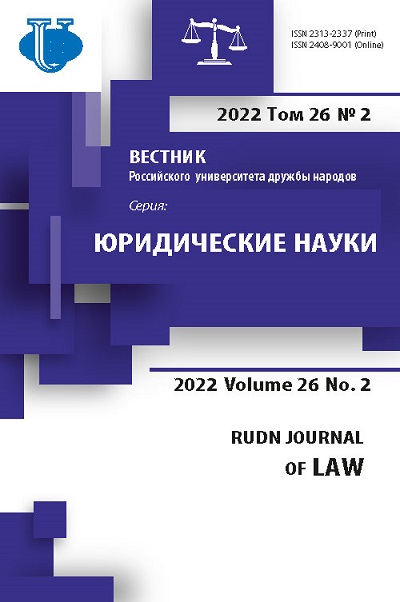Роль цифровизации во взаимодействии судебных и нотариальных органов в применении примирительных процедур
- Авторы: Бегичев А.В.1
-
Учреждения:
- Российский университет дружбы народов
- Выпуск: Том 26, № 2 (2022)
- Страницы: 485-500
- Раздел: ПРОЦЕССУАЛЬНОЕ ПРАВО. ПРОКУРОРСКИЙ НАДЗОР
- URL: https://journals.rudn.ru/law/article/view/31096
- DOI: https://doi.org/10.22363/2313-2337-2022-26-2-485-500
- ID: 31096
Цитировать
Аннотация
Исследован порядок цифрового взаимодействия суда и нотариата в вопросах применения внесудебных примирительных процедур в период всеобщей диджитализации межведомственного взаимодействия, позволяющей установить новые формы защиты прав и законных интересов граждан и юридических лиц при разрешении гражданско-правовых споров. Автор проводит анализ возможностей цифрового правосудия и выводит критерии взаимодействия органов нотариата и суда при использовании медиативных соглашений, заключенных в нотариальной форме. Изучено современное состояния правозащитной деятельности электронного нотариата по удостоверению дистанционных медиативных соглашений. Цель: сформировать представление о новых возможностях нотариата по нотариальному удостоверению дистанционных медиативных соглашений и формированию перспективной платформы цифрового взаимодействия органов нотариата и суда, основанных на анализе нормативно-правовых актов и научных источников. Методы: сравнительно-правовой, описания, интерпретации; теоретические методы формальной и диалектической логики. Применялись также частно-научные методы: юридико-догматический и метод толкования правовых норм. Результаты: Проведенное исследование показало, что дистанционное совершение медиативных соглашений, имеющих силу исполнительных документов, в условиях увеличивающегося влияния цифровых технологий на правозащитную деятельность суда и нотариата, приобретает важное значение в вопросах защиты прав субъектов экономических отношений, предоставляющее возможность снижения нагрузки на суд и экономию затратных ресурсов для скорейшего достижения консенсуса в правовом конфликте.
Об авторах
Александр Валерьевич Бегичев
Российский университет дружбы народов
Автор, ответственный за переписку.
Email: begichev100@mail.ru
доктор юридических наук, профессор кафедры гражданского права и процесса и международного частного права, Юридический институт Российская Федерация, 117198, г. Москва, ул. Миклухо-Маклая, д. 6
Список литературы
- Бегичев А.В. Осуществление правозащитной функции нотариата в судебном процессе // Научное мнение. 2015. № 3-2. С. 35-41.
- Begichev, A.V., Grebennikov, V.V. & Domanov, V.N. (2017) Human Rights Functions of Lawyers and Notaries as Civil Society Institutions in Russian Federation. International Journal of Environmental and Science Education - IJESE. 12 (1), 79-86.
- Брановицкий К.Л., Ярков В.В. Возможные направления трансформации цивилистического процесса в условиях цифровизации и пандемии: предиктивное правосудие // Российское право: образование, практика, наука. 2021. № 4. С. 19-26. https://doi.org/10.34076/2410_2709_2021_4_19
- Ermakova, E.P., Frolova, E.E. & Sitkareva, E.V. (2020) New Trends in Developing Alternative Ways to Resolve Financial Disputes. Journal of Politics and Law. 13 (3), 280-286. https://doi.org/10.5539/jpl.v13n3p280
- Ermakova, E. P. & Frolova, E. E. (2022) Using Artificial Intelligence in Dispute Resolution. In: Inshakova A.O., Frolova E.E. (eds) Smart Technologies for the Digitisation of Industry: Entrepreneurial Environment. Smart Innovation, Systems and Technologies. Vol. 254. Springer, Singapore, pр. 131-142. https://doi.org/10.1007/978-981-16-4621-8_11
- Frolova, E. E. & Ermakova, E. P. (2022) Utilizing Artificial Intelligence in Legal Practice. In: Inshakova A.O., Frolova E.E. (eds.). Smart Technologies for the Digitisation of Industry: Entrepreneurial Environment. Smart Innovation, Systems and Technologies. Vol. 254. Springer, Singapore, pр. 17-27. https://doi.org/10.1007/978-981-16-4621-8_2
- Greene, R. (2018) The Laws of Human Nature. Kindle Edition. Viking Press
- Inshakova, A.O., Frolova, E.E., Rusakova, E.P. & Kovalev, S.I. (2020) The model of distribution of human and machine labor at intellectual production in industry 4.0. Journal of Intellectual Capital. 21 (4), 601-622. https://doi.org/10.1108/JIC-11-2019-0257
- Kashanin, A. V., Kozyreva, A.B., Kurnosova, N.A. & Malov, D.V. (2020) Information technologies in justice: state and prospects. Russia and the world. Analytical report. Moscow. Available at: http://xn--o1abds.xn--p1ai/wp-content/uploads/2020/07/w-informacionnie-tehnologii-v-pravosudii.pdf [Accessed 29th January 2022].
- Кашанин А.В., Козырева А.Б., Курносова Н.А., Малов Д.В. Информационные технологии в правосудии: состояние и перспективы. Россия и мир. Аналитический доклад. М., 2020. Режим доступа: http://xn--o1abds.xn--p1ai/wp-content/uploads/2020/07/w-informacionnie-tehnologii-v-pravosudii.pdf (дата обращения: 29.01.2022)
- Корсик К.А. Нотариат и правосудие в период распространения коронавирусной инфекции на территории Российской Федерации // Нотариальный вестник. 2020. № 04-05. С. 2-4
- Корсик К.А. Медиация в практике нотариуса // Нотариальный вестник. 2020. № 9. С. 2-3
- Синенко В. С. Принцип добровольности процедуры медиации: содержание и проблемы реализации // Вестникъ судейского сообщества Белгородской области. 2019. № 10. С. 40-45
- Rusakova, E. & Frolova, E. (2022) Judicial reconciliation as a way to popularize the jurisdictional form of protection of rights and legitimate interests in modern Russia. The transformation of social relationships in Industry 4.0. Economic security and legal prevention. Information age publishing. 147-156
- Rusakova, E.P., Frolova, E.E. & Inshakova, A.O. (2021) The Procedure of Mediation in the Age of Industry 4.0. In: Popkova E.G., Sergi B.S. (eds.). Modern Global Economic System: Evolutional Development vs. Revolutionary Leap. ISC 2019. Lecture
- Notes in Networks and Systems. Vol. 198. Springer, Cham, pp. 947-953. https://doi.org/10.1007/978-3-030-69415-9_105
- Зарубина М.Н. Особенности и проблемы реализации принципов медиации в России // Вестник гражданского процесса. 2012. № 6. С. 180-185
Дополнительные файлы















